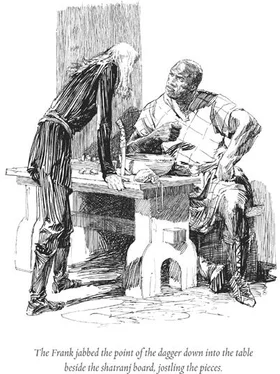Michael Chabon - Gentlemen of the Road
Здесь есть возможность читать онлайн «Michael Chabon - Gentlemen of the Road» весь текст электронной книги совершенно бесплатно (целиком полную версию без сокращений). В некоторых случаях можно слушать аудио, скачать через торрент в формате fb2 и присутствует краткое содержание. Жанр: Исторические приключения, на английском языке. Описание произведения, (предисловие) а так же отзывы посетителей доступны на портале библиотеки ЛибКат.
- Название:Gentlemen of the Road
- Автор:
- Жанр:
- Год:неизвестен
- ISBN:нет данных
- Рейтинг книги:3 / 5. Голосов: 1
-
Избранное:Добавить в избранное
- Отзывы:
-
Ваша оценка:
- 60
- 1
- 2
- 3
- 4
- 5
Gentlemen of the Road: краткое содержание, описание и аннотация
Предлагаем к чтению аннотацию, описание, краткое содержание или предисловие (зависит от того, что написал сам автор книги «Gentlemen of the Road»). Если вы не нашли необходимую информацию о книге — напишите в комментариях, мы постараемся отыскать её.
Gentlemen of the Road — читать онлайн бесплатно полную книгу (весь текст) целиком
Ниже представлен текст книги, разбитый по страницам. Система сохранения места последней прочитанной страницы, позволяет с удобством читать онлайн бесплатно книгу «Gentlemen of the Road», без необходимости каждый раз заново искать на чём Вы остановились. Поставьте закладку, и сможете в любой момент перейти на страницу, на которой закончили чтение.
Интервал:
Закладка:
The troopers set about scaling the towers that flanked the gate, but they could not gain a toehold in the masonry, and so they improvised a harness from rope and lashed a half-dozen horses together and set the team to work pulling at an iron hasp in the left-hand door. This proved to be futile as well, and men were sent to pile kindling at the doors’ base. Then Amram leapt from the horse and held out his arms, and his bonds were cut. He took hold of the rope that still bound the horses to the gate and, with a slap on the hindquarters of the biggest animal, put his own back into the effort. Zelikman could hear the singing of the rope and the low oaken moaning of the gate, followed a moment later by an echoing bang like the crack of an immense whip. The doors fell open, and with ululating cheers the riders poured into the city they had arrived at too late to save. The last Northmen hauled themselves, along with their booty, onto the only ship that had not yet set sail just as the first Arsiyah rode out onto the burning wharfs. Under the weight of horses and armor the wharfs collapsed, throwing up a spectacular cloud of vapor and sparks.
Zelikman lowered the eyeglass, returned it to its doeskin pouch and then summoned Hillel and drove him at a gallop down to the town. The Arsiyah had seen him only by moonlight, with his hat lowered and his cloak flying. And if prior circumstance had inclined them to view him as an enemy-through soldierly habit, and because of his undeniable theft of the horse they had stolen from those who had stolen it from Ze-likman, who had stolen it from a thief-the Arsiyah would now be in need of him, with his salves and his ointments and his willingness to stoop to the lowly work of the surgeon.
In the first group of refugees he fell among he found a dozen burned, punctured, battered and maimed, bleeding from raw and tumultuous wounds. Rumor of the miraculous advent of a white-skinned barber soon traveled all the way to the mouth of the river and back, so that to ride the seven rods that lay between him and the city gates required the remainder of the daylight, the better part of his pharmakon and his entire stock of fine silken thread.
He entered the city caked in blood, hungry and hollowed out, having vomited twice in the course of the day in reaction to the odors emitted by particularly vile wounds, his eyes stung by smoke, the wailing of babies haunting his ears. He sat his horse, hardly aware of the crackling fires, the barren doorsteps and the empty holes of housefronts, the carrion birds, the soldiers who gaped at him as he passed, trusting Hillel to search out and choose the street or alley that would lead to Amram. They passed into a narrow defile flanked by high houses that reached out for one another as they rose overhead until they were parted only by a cool dark band of twilight. The horse's shoeless hooves struck the paving stones with a knock like iron on bones, and then they emerged into a broad square, nearly as spacious as the piazza at Ravenna, and there on the wide steps of the despoiled mosque, one of whose minarets stood blackened and frail as a burned-out brand, with his arm around the slim shoulders of Filaq and a snoring Hanukkah curled at his feet, wearing the dice-playing smile of a man who could never be surprised, sat Amram.
He rose a little unsteady to his feet. His face was streaked with ash, ash lay on his hair and scalp and his eyes were crazed with pink. He came wincing down the steps of the mosque as if his back or hips were bothering him, and he and Zelikman fell into each other's arms. From within the mosque came the broken voices of men at prayer. Amram stank of burned tallow, smoke and a hard day's labor, but underneath it all there was the familiar smell of him like sun on dusty sandstone. The sound of prayer found some kind of grateful echo in Zelikman's heart.
“Late as usual,” Amram said.
CHAPTER SEVEN
Hanukkah had been kicked awake by worse men, among them his own father, and so the curses he muttered, with his eyes shut and the honeyed hand of a dream still caressing his thigh, extended no further into history than the African's great-grandmother and confined themselves to envisioning her use by scabby Pecheneg stallions, making only glancing reference to the attentions of Bactrian camels. The true object of Hanukkah's spleen was wakefulness itself and the world that it would oblige his five outraged senses to certify. Hanukkah had soldiered in the army of an empire at peace and had thus dealt and witnessed death only in small batches, and he was shocked by the scale of slaughter he had seen today, wrought by foreign invaders against Khazar men and women like him- children of Kozar the son of Togarmah the son of Gomer the son of Japheth the son of Noah- “people of the felt walls,” burners of dung fires, sworn to the solitary god of the clear blue sky, whether that god was called Tengri, Jehovah or Allah. Most of all he was shocked by the pointless butchering of a stranded Rus, mute, dazed and trembling with some fever, white as a fish belly, who was dragged by the Arsiyah from his hiding place and slashed open like a gushing sack of wine. After that, Hanukkah curled up on the steps of the mosque and withdrew into sleep and his dream of Sarah, of the faint smell of burning sandalwood when she took his head into her lap, a dream from which Amram's toe now dislodged him with all the tenderness of a boathook
Hanukkah sat up, and opened his eyes, and saw amid the smoke, dust devils and steady snow of ash a gaunt, bloodied figure, tottering, asleep on his feet, his black cloak crusted and dragging behind him, the air around him wavering in a madness of flies.
At the sight of the Frank who had saved his life, Hanukkah felt something swell inside him, like the bladder that kept a sturgeon buoyant and swimming true in the dark of the Khazar Sea. Men could be broken more terribly than he had ever imagined; but they could also be repaired. Hope was a powerful cordial, and for a moment, with the burn of it at the back of Hanukkah's throat, he could only stand there, barking like a goose. Then he wiped his face on his filthy sleeve and hurried to Zelikman's side.
“Sit,” he said, “please.”
He sat the Frank down on the steps, pulled off his boots and fetched some water from a cistern. Some of the water he mixed with wine and passed to Zelik-man in an overturned steel helmet. The rest he used to wash the blood from Zelikman's hands and face and to bathe his feet. From this mild and voluntary act of self-abasement, from the routine business of cistern and dipper and the wringing of a cloth, from the Frank's pale feet with their surprisingly soft ankles, Hanukkah derived a measure of comfort and regained his spirits. He found a neglected passage behind the mosque that the Rus had disdained to plunder, and in a cellar there a pair of toothless old sisters who at extortionate prices provided him with cold porridge, some lentils and mint, a bag of apples and the butt of a lamb sausage. He gave the food to Zelikman, who ate, and drank, and rested, talking to the African in Greek or Latin.
The subject of their conversation appeared to be Filaq, who sat slumped on the steps of the mosque with his chin in his hands, wearing a mask of tear streaks and ash. The stripling had scarcely moved in the hours since the Arsiyah mercenaries had paroled their prisoners to shift for themselves, saying nothing at all for what struck Hanukkah as an abnormally long period of time. With his smudged cheeks and staring eyes he seemed younger than ever, a child with an empty belly too weary to sleep. He did not appear to notice when the Arsiyah at last came trudging out of the mosque and clattering down the steps around him, stooped as by time or a heavy load, their gait uncertain, their evening lifting of their voices toward far-off Mecca having done little to ease the painful knowledge of their failure to defend this Muhammadan town from destruction by the Northmen. They loitered in the square, cast down, aimless. Their commander was dead, drowned in the collapse of the wharves. The surviving captains could not come to agreement on whether they ought to pursue and punish the Rus or return to Atil and face condemnation, and possibly execution, by the bek for having disobeyed his direct order that no one interfere with or harass the Northmen in their “trading mission” among the peoples of the littoral. This order was accompanied by rumors that these same ambitious Northmen had backed the new bek in his coup; but an order it remained. Now the Arsiyah, whose most prized asset as with all mercenary elites was not their skill at arms and horsemanship or fearsome reputation but the stainless banner of their loyalty, found themselves confronted by the dawning awareness that the only thing less forgivable than a mutiny was a mutiny that failed.
Читать дальшеИнтервал:
Закладка:
Похожие книги на «Gentlemen of the Road»
Представляем Вашему вниманию похожие книги на «Gentlemen of the Road» списком для выбора. Мы отобрали схожую по названию и смыслу литературу в надежде предоставить читателям больше вариантов отыскать новые, интересные, ещё непрочитанные произведения.
Обсуждение, отзывы о книге «Gentlemen of the Road» и просто собственные мнения читателей. Оставьте ваши комментарии, напишите, что Вы думаете о произведении, его смысле или главных героях. Укажите что конкретно понравилось, а что нет, и почему Вы так считаете.












